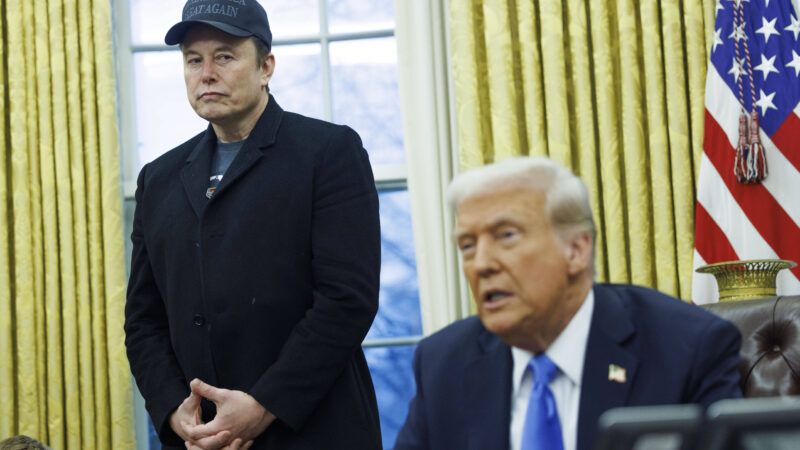Elon Musk's 'Proof' of Government Waste Is in the Pudding
Is the fraud in the room with us right now? Yes.

Earlier this week, Elon Musk appeared at the Oval Office with President Donald Trump; Musk's son, X Æ A-Xii, even made an appearance. Citing a desire for "maximum transparency," the tech billionaire discussed the efforts of his Department of Government Efficiency (DOGE) to identify and eliminate waste, fraud, and abuse within the federal government.
Here was how The New York Times described the press conference: "In Oval Office, Musk Says Without Proof That Bureaucracy Is Rife With Fraud."
The New York Times says "Musk Asserts Without Proof That Bureaucracy Is Rife With Fraud." Seriously? The GAO — under Biden — estimated last year that we are losing $233-$521 billion *per year* to fraud. Guys, it's right there. Why do you continue with this… fraud? SMH pic.twitter.com/p2ceZhNLuQ
— Michael Shellenberger (@shellenberger) February 12, 2025
Later, the newspaper tweaked the headline to read: "At Oval Office, Musk Makes Broad Claims of Federal Fraud Without Proof."
To be maximally charitable to the Times, they did not actually state that claims of federal fraud are baseless, just that Musk failed to proffer examples. Musk did cite examples of government processes clearly in need of updating, including the infamous, inefficient limestone mine where government employee papers are kept—something that sounds completely ridiculous but actually exists.
When they are digging too deep and too greedily in the limestone mine where the federal employees' paperwork is kept… pic.twitter.com/GDcHIS2klS
— Robby Soave (@robbysoave) February 12, 2025
Even so, the Times is clearly treating the claim that the bureaucracy is rife with fraud as extraordinary. And extraordinary claims do require evidence to back them up. It's not an extraordinary claim, however. It is already well established and documented. While the beneficiaries of the fraud are not typically the bureaucrats themselves—though this does happen—the opaque, inefficient, and duplicative processes of our massive federal government allow scammers to misappropriate public funds.
The government itself is aware that fraud exists at a massive scale. The Government Accountability Office (GAO) estimates that the federal government loses hundreds of billions of dollars each year due to fraud. Medicare-related fraud has permitted health care insurers to pocket $50 billion in reimbursements for diseases that doctors never treated. Fraudsters collected an estimated $135 billion in fraudulent COVID-19 unemployment payments, and unless Congress acts to extend the statute of limitations, this money will never be recouped by the government.
National security funds are routinely misspent or disappeared. The Pentagon has failed seven audits in a row and often can't account for missing money; last year, the Defense Department admitted that it lost $8.2 billion in Ukraine. The federal government spent $61 billion rebuilding Iraq: 15 percent of the funds were misspent, and another 10 percent simply disappeared, according to government auditors. In Afghanistan, it's much the same: The Taliban-controlled central bank is a recipient of U.S. funds.
To the mainstream media's credit, many of these frauds have been expertly and exhaustively covered by journalistic institutions. The Wall Street Journal, ProPublica, and yes, The New York Times, have done terrific work exposing financial impropriety within the federal government. That's why it's odd to see the Times glaring suspiciously at Musk, as if this is the claim that makes him some kind of wide-eyed conspiracy theorist. The fraud is real, and they know it!
This Week on Free Media
I am joined by Amber Duke to discuss CNN's "constitutional crisis," Joy Reid's war on Musk, the gerontocracy, and Joe Rogan's latest advice for Democrats.
Worth Watching
I am finally catching up on the final season of HBO's Search Party, which was released back in 2022. It's a black comedy satire of millennial eccentricities, starring Alia Shawkat of Arrested Development. The first season premiered in 2016, and I started watching it after briefly meeting Shawkat at a White House Correspondents' Dinner party. Shawkat portrays Dory Sief, who is investigating the disappearance of a college acquaintance. The initial premise is something along the lines of a whodunit, but later seasons involve much more outlandish plot lines: a murder trial, a kidnapping, and, finally, zombies. I have two more episodes to go, so I won't render a verdict yet.


Show Comments (86)